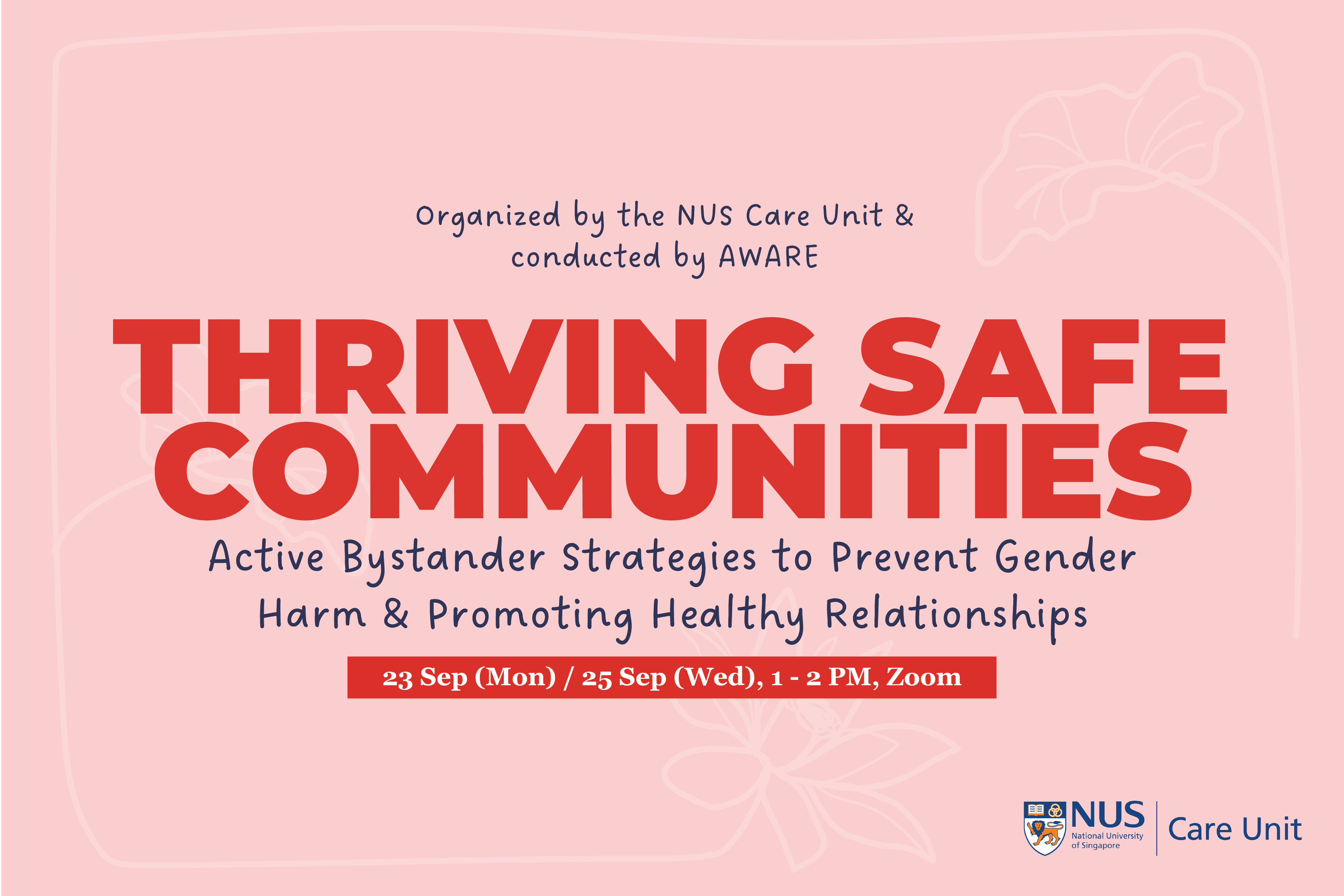Recap: Active Bystander Online Workshop (23 & 25 Sep 2024)
18 Nov 2024 | Events – Online Workshop

By: Lim Rui Wen
On 23 and 25 September 2024, the NUS Care Unit (NCU) organised two online workshops on active bystander strategies, which were made possible by the e-vouchers donated by students from the 2024 Campus Climate Survey (CCS) on Sexual Victimisation Experiences.
The workshops, titled “Thriving Safe Community: Active Bystander Strategies to Prevent Gender Harm and Promoting Healthy Relationships”, were conducted by the Association of Women for Action and Research (AWARE).
The workshops aimed to impart students with the strategies to recognise and understand inappropriate behaviours and the knowledge on how to intervene as active bystanders.
This is in line with NCU’s tagline this academic year: Step In, Take Action.

Around 50 students attended the workshops. The workshops were jointly facilitated by Annette S. Vincent and Izzaty Ishak from AWARE’s Support, Partner, and Act through Community Engagement (SPACE) arm, both of whom have extensive experience in training and advocacy.
In a poll conducted during the workshop, 73% of participants polled shared that they have either experienced sexual misconduct or know someone who has experienced sexual misconduct.
This highlights that sexual misconduct is not an isolated issue, but a common one within the community.
When participants were asked about the barriers to being an active bystander, the most frequently cited reason was “feeling too shy or afraid to speak up”. The trainers further elaborated on additional obstacles that can hinder intervention, such as personal discomfort, social dynamics, and concerns about affecting relationships.
Despite these challenges, the trainers emphasised that with the right strategies, being an active bystander can make a significant impact on both the victim-survivor and the perpetrator.
Participants then learned about the strategies to identify inappropriate behaviours such as microaggressions, stalking behaviour and intimate partner violence, and had a go at applying bystander intervention strategies using two essential frameworks:
- The 3Rs Framework: Recognise, Respond, Refer
- The 5Ds of Bystander Intervention: Direct, Delegate, Distract, Document, Delay


These frameworks empower bystanders to confidently recognise harmful behaviours, take appropriate actions, and support victims. In particular, the 5Ds provide multiple intervention strategies that cater to different comfort levels and situations, ensuring safety for both the active bystander and the victim-survivor.
Through interactive case scenarios, participants learned more about how to apply these strategies in simulated scenarios. They observed examples of inappropriate behaviour and chimed in on how they would likely intervene.
The workshops were deeply insightful and successfully instilled readiness, empowering participants to play an active role in fostering a culture of care and mutual care at NUS.

A key takeaway from the workshops was that intervention does not always have to be direct or confrontational. While the fear of safety or retaliation may hinder intervention, the 5Ds framework provides a variety of approaches to choose from. For example, one can distract by talking to or asking the victim-survivor about something completely unrelated.
What matters most is selecting a strategy that prioritises the safety of everyone involved, and that small actions can make meaningful differences.
If you or someone you know is affected by sexual misconduct, please reach out to NCU for support by calling our sexual misconduct helpline (+65 6601 4000) or emailing us at ncu_help@nus.edu.sg.
You can also read our FAQs on seeking medical attentiion here.
NUS Care Unit
- University Health Centre,
- 20 Lower Kent Ridge Road,
- #B1-09, Singapore 119080
- For general enquiries:
- +65 6601 3155
- ncu_admin@nus.edu.sg
- Office hours:
Monday - Friday: 9am - 5pm - Website Feedback

